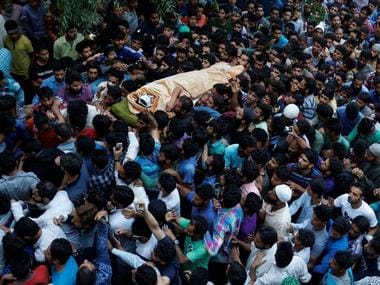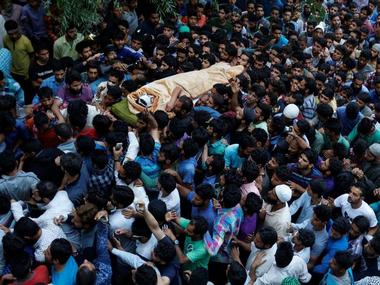A day after the Opposition raised the issue of unrest in Kashmir in Rajya Sabha and urged the Prime Minister to break his silence, Narendra Modi on Tuesday reached out to the disgruntled valley. In a long address delivered from a public rally in Madhya Pradesh, the PM repeatedly appealed for peace and vowed to follow Vajpayee’s Kashmir roadmap but given Pakistan’s overt and covert role in stoking insurgency fire, it’s doubtful whether Modi’s placatory messages will serve any meaningful purpose. The violence in Kashmir that was ignited with the killing of terrorist Burhan Wani by Indian security forces entered its 32nd day. So far, 58 people have died and many thousands (including security personnel) injured. Curfew continues uninterrupted and so does security restrictions and frequent blacking out of mobile communications. Normal life is severely affected. This vicious cycle of violence followed by security measures that in turn gives rise to more violence causing stricter steps is the last, desperate bid by India’s rogue neighbours for whom Kashmir remains an unfinished business. Truth to tell, the Prime Minister’s options are limited. As the acting head of Indian state, he must not only do what is right but must also be perceived in doing what is right. In makes for an unequal battle and cripples Indian response to Pakistan’s proxy war. There is no longer even a shadow of doubt that the latest spate of carnage has been exclusively shaped and designed by the Pakistan deep state. It has unleashed its pet non-state actors to foment trouble while a conniving Hurriyat, whose leaders carry Indian passports, is more than happy to do Pakistan’s bidding in keeping alive the flames of disgruntlement. And even as Pakistan-sponsored terrorists use Kashmiri youths, women and even children as a cover to attack Indian security forces, Pakistan has launched a diplomatic blitzkrieg running from one international pillar to another post, crying foul over “Indian brutality in Kashmir”. And in this perception battle, it has found an unlikely ally among a section of India’s intelligentsia which has gone to the extent of even calling for a plebiscite in Kashmir. [caption id=“attachment_2916104” align=“alignleft” width=“380”]  Kashmiris carrying the body of Burhan Wani. Reuters[/caption] Whatever the ground realities, at least publicly, Modi could do little else than extending a healing touch. Which is what he did while speaking at a rally to mark the birth anniversary of freedom fighter Chandrashekhar Azad in Bhabra, Madhya Pradesh. “Kashmir, which we give so much love to, some people there are causing it a lot of harm. Boys who should be holding laptops, bats, balls in their hands and dreams in their hearts are ones carrying stones. Kashmir wants peace. Whatever Kashmiris want for betterment of their livelihood, the Centre will help,” he said. Turning the word ‘azaadi’ around, Modi said Kashmir has the same hard-earned freedom that Indians everywhere enjoy. But some, he said, who are unable to digest it are clinging onto the path to destruction. “Politics of some people is clicking but what will happen to these gullible and simple youths. Humanity and Kashmiriyat will not be allowed to be hit,” he said, stressing on democracy and dialogue as the only options. “When Atal Bihari Vajpayee was the Prime Minister he had adopted the path of insaniyat, jamhuriyat and Kashmiriyat and we walk the same road… Governments of India and Jammu & Kashmir, besides 125 crore Indians, wish you well. They want your development. Whatever India has to give for your development, we are ready to give.” In promising to walk Vajpayee’s path and indicating that he is not averse to opening purse strings further if need be, Modi showed faith in the tried and tested (and failed) New Delhi policy. When the nature of the rift is political and is taking a turn to the worse with Valley’s radicalisation rapidly changing the nature of the game, these oft-repeated platitudes carry little meaning and economic sops serve little purpose. In an interview to Timesnow channel, former Ambassador to the US from Pakistan Husain Haqqani — writer of two books Magnificent Delusions and India versus Pakistan — revealed in great detail the minutes of Pakistan’s proxy war. He said the country allocates almost 75% of its budget towards the military and instead of focusing on the prosperity of its people, its leaders have chosen to define Pakistani nationalism through the prism of India. These are not exactly a state secret. We have JuD chief Hafiz Saeed and other terrorists in an anti-India rally boast that “in three days we made arrangements to cause havoc in Kashmir. We are organising it, leading it, and funding it, as part of the terror we want in Kashmir. Indian forces will now have to face this… we will raise the Pakistani flag in Kashmir.” We have a Pakistani terrorist, captured alive by Indian security forces, admitting the extent of Hafiz Saeed and Syed Salahuddin’s involvement in the violence. Bahadur Ali alias Saiffullah, who was caught in Kupwara sector, revealed that he met Saeed twice in the Muzaffarabad training camp. We have Saeed claiming, as seen in a viral video, how pro-Pakistani separatist Asiya Andrabi called him for support following Wani’s death and how he “arranged for help” during the funeral. We have the interview of Wani’s father, whose statement that Wani died for Islam and Allah gives us a clear indication that Pakistan’s strategy to usher in a new wave of militancy, mass protests and demands for ‘azaadi’ is actually the “means” to achieve the “end” of turning Kashmir into a hegemonic Islamic Caliphate aided and abetted by the deep state. Modi may have waxed lyrical on Kashmir, but the fact remains that Kashmir violence is no voluntary outburst of anger triggered by Wani’s killing. As Brig Anil Gupta, Jammu-based columnist, political commentator and security and strategic analyst says in Kashmir Turmoil: Proxy War is only a means to an end, the problem is not a lack of faith in India’s rule, nor is it the alienation of Kashmiris because of poor governance. It is not a lack of outreach by the elected representatives, trust-deficit or any sense of betrayal between the youth and the government. It is the ISI at work in Kashmir and any resolution of the dispute must be a rounded approach. the Prime Minister has sent the right signal from his rampart. But on ground, there needs to be a combination of iron will and healing touch. And utmost importance must be laid in preventing Kashmir from getting radicalised. Exiled Kashmiri leader and spokesperson of the United Kashmir People’s National Party (UKPNP) Nasir Aziz Khan;s statement post Burhan Wani’s death is instructive. “One thing we should keep in mind that Pakistan has no love with Kashmiris. She is exploiting religious sentiments of the Kashmiris and is plundering their natural resources.” This is the crux.
Modi may have waxed lyrical on Kashmir, but the fact remains that Kashmir violence is no voluntary outburst of anger triggered by Wani’s killing.
Advertisement
End of Article


)
)
)
)
)
)
)
)
)



